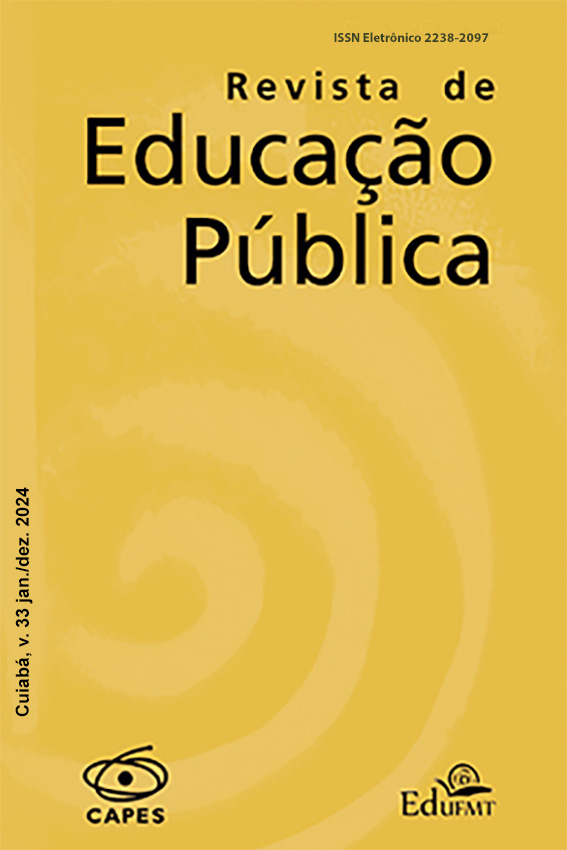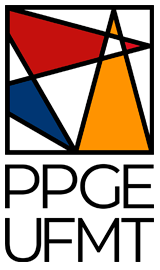ESTRATÉGIAS DE APRENDIZAGEM – INTERVENÇÃO NUMA ESCOLA PÚBLICA DE ENSINO MÉDIO INTEGRADO AO TÉCNICO
DOI:
https://doi.org/10.29286/rep.v33ijan/dez.14678Palavras-chave:
Autorregulação da aprendizagem, Estratégias de aprendizagem, Ensino médio, IntervençãoResumo
Este estudo verificou os efeitos de um programa de intervenção com um material didático fundamentado na Teoria Social Cognitiva para o incentivo do uso de estratégias de aprendizagem. Na primeira fase, os 59 participantes de primeiros anos do ensino médio integrado ao técnico foram avaliados por meio de uma escala, utilizada como pré-teste. Na segunda fase ocorreu o programa de intervenção nos grupos experimental e controle. Na terceira fase foi aplicado o pós-teste. Os resultados não confirmaram a hipótese de que o grupo experimental apresentaria escores superiores ao grupo controle, mas houve conscientização dos alunos quanto ao uso devido das estratégias.
Downloads
Referências
ALLIPRANDINI, P. M. Z.; SANTOS, D. A. dos. A promoção do uso de estratégias cognitivas em alunos do Ensino Médio. Psicologia Escolar e Educacional, SP. v. 22, n. 3, p. 535-543, 2018. DOI: http://dx.doi.org/10.1590/2175-35392018033143
BANDURA, A.; AZZI, R. G.; POLYDORO, S. Teoria Social Cognitiva: conceitos básicos. Porto Alegre: Artmed, 2008.
BORUCHOVITCH, E. Estratégias de aprendizagem e desempenho escolar: considerações para a prática educacional. Psicologia Reflexão e Crítica, v. 12, n. 2, p. 361-375, 1999. DOI: https://doi.org/10.1590/S0102-79721999000200008
BORUCHOVITCH, E.; GOMES, M. A. M. Aprendizagem autorregulada: Como promovê-la no contexto educativo?. Petrópolis, RJ: Vozes, 2019.
BORUCHOVITCH, E.; SANTOS, A. A. A. Psychometric Studies of the Learning Strategies Scale for University Students. Paidéia jan.-abr. 2015, v. 25, n. 60, p. 19-27. DOI: http://dx.doi.ort/10.1590/1982-43272560201504
BUTRON-ZAMORA, P. O.; SANCHEZ-RUIZ, J. G. Características en estrategias de aprendizaje en matemáticas por alumnos mexicanos de bachillerato. Cuad. Investig. Educ., Montevideo, v. 12, n. 1, p. 34-54, 2021. DOI: http://dx.doi.org/10.18861/cied.2021.12.1.3012
CASIRAGHI, B.; BORUCHOVITCH, E.; ALMEIDA, L. S. Crenças de autoeficácia, estratégias de aprendizagem e o sucesso acadêmico no Ensino Superior. Revista E-Psi, v. 9, n. 1, p. 27-38, 2020. Disponível em: https://revistaepsi.com/wp-content/uploads/artigos/2020/Ano9-Volume1-Artigo2.pdf. Acesso em: 09 jul. 2024.
CRESWELL, J. W. Projeto de pesquisa: métodos qualitativo, quantitativo e misto. Porto Alegre: Artmed, 2010.
DARROZ, L. M.; TREVISAN, T. L.; ROSA, C. T. W. Estratégias de Aprendizagem: caminhos para o sucesso escolar. Amazônia: Revista de Educação em Ciências e Matemáticas, [S.I], v. 14, n. 29, p. 93-109. 2018. DOI: http://dx.doi.org/10.18542/amazrecm.v14i29.5473
ENRÍQUEZ, E. B. et al. Calidad del aprendizaje del alumnado de educación secundaria: impacto de estrategias de aprendizaje, autoeficacia y género. Revista Ensino de Ciências e Humanidades – Cidadania, Diversidade e Bem-estar, v. 1, n. 1, p. 8–27. 2017. Disponível em: https://periodicos.ufam.edu.br/index.php/rech/article/view/4728/3833. Acesso em: 09 jul. 2024.
GOES, N. M.; BORUCHOVITCH, E. Estratégias de aprendizagem: como promovê-las?. Petrópolis, RJ: Vozes, 2020.
GOSS-SAMPSON, M. Statistical analysis in JASP: A guide for students, 2020. DOI: http://dx.doi.ort/10.6084/m9.figshare.9980744
JENKINS, T. On the difficulty of learning to program. In: PROCEEDINGS OF 3RD ANNUAL LTSN_ICS CONFERENCE (Loughborough University, United Kingdom), 2002. The Higher Education Academy, p. 53-58. Disponível em: http://citeseerx.ist.psu.edu/viewdoc/download?doi=10.1.1.596.9994&rep=rep1&type=pdf. Acesso em: 09 jul. 2024.
JERONYMO, G. F. D; ALLIPRANDINI, P. M. Z. Estratégias de aprendizagem e variáveis sociodemográficas de professores de licenciaturas. Revista Eletrônica de Educação. São Carlos, v. 14, p. 1-18, 2020. DOI: http://dx.doi.org/10.14244/198271992911
KADIOGLU-AKBULUT, C.; UZUNTIRYAKI-KONDAKCI, E. Implementation of self-regulatory instruction to promote students' achievement and learning strategies in the high school chemistry classroom. Chem. Educ. Res. Prato, v. 22, p. 12-29, 2020. DOI: http://dx.doi.org/10.1039/c9rp00297A
MARTINS, R. M. M.; SANTOS, A. A. A. Estratégias de aprendizagem e autoeficácia acadêmica em universitários ingressantes: estudo correlacional. Psicol. Esc. Educ., Maringá, v. 23, 2019. DOI: http://dx.doi.org/10.1590/2175-35392019016346
MULYANI, E. R.; SUHERDI, D.; SUNDAYANA, W. Indonesia Islamic senior high school students’ English learning conceptions and strategies. Indonesian Journal of Applied Linguistics, v. 9, n. 3, p. 572-579, 2020. DOI: http://dx.doi.org/10.17509/ijal.v9i3.23207
NUGRAHA, R. A.; DEGENG, N. S. I.; HANURAWAN, F.; CHUSNIAH, T. The Effect of Self-Regulated Learning on High School Students’ Self-Efficacy, International Journal of Development Research, v. 7, n. 7, p. 13612-13617. 2017. Disponível em: https://www.journalijdr.com/effect-self-regulated-learning-high-school-students%E2%80%99-self-efficacy. Acesso em: 09 jul. 2024.
OLIVEIRA, K. L.; SANTOS, A. A. A. dos; INÁCIO, A. L. M. Estratégias de aprendizagem no ensino médio brasileiro: análise exploratória dos resultados. Revista de Estudios e Investigacióne, v. extr., n. 1, 2017. DOI: https://doi.org/10.17979/reipe.2017.0.01.3041
OWUSU, A. A.; COBBOLD, C. Factors that Influence Learning Strategy Use among Senior High School Economics Students in Ghana: A Quantitative Approach. International Journal of Learning, Teaching and Educational Research, v. 19, n. 5, p. 167-185, 2020. DOI: https://doi.org/10.26803/ijlter.19.5.10
PALITOT, M. D. et al. A relação entre estratégias de aprendizagem e rendimento escolar no ensino médio. Revista de Pesquisa Interdisciplinar, [S.I.], v. 2, n. 2, ago. 2019. DOI: http://dx.doi.org/10.24219/rpi.v2i2.456
PERASSINOTO, M. G. M.; BORUCHOVITCH, E.; BZUNECK, J. A. Estratégias de aprendizagem e motivação para aprender de alunos do Ensino Fundamental. Avaliação Psicológica, v. 12. n. 3, p. 351-359, 2013. Disponível em: http://pepsic.bvsalud.org/scielo.php?script=sci_arttext&pid=S1677-04712013000300010. Acesso em: 09 jul. 2024.
POZO, J. J. Estratégias de Aprendizagem. In: COLL, C., MARCHESI, A., PALÁCIOS, J. (org.), Desenvolvimento psicológico e educação: psicologia da educação. Porto Alegre: Artes Médicas, 1996. p. 176-197.
RODRIGUEZ ZAMORA, R.; ESPINOZA NUNEZ, L. A. Trabajo colaborativo y estrategias de aprendizaje en entornos virtuales en jóvenes universitarios. RIDE. Rev. Iberoam. Investig. Desarro. Educ, Guadalajara, v. 7, n. 14, p. 86-109, jun. 2017. DOI: http://doi.org/10.23913/ride.v7i14.274
SANTOS, D. A.; ALLIPRANDINI, P. M. Z. O ensino de estratégias de aprendizagem por integração curricular na disciplina de biologia: uma experiência pedagógica. Revista Educação. v. 45, 2020. Disponível em: https://periodicos.ufsm.br/reveducacao/article/view/38552/pdf. Acesso em: 09 jul. 2024.
SCHUNK, D. H. Teoria Social Cognitiva na Educação: contribuições e direções futuras. In: AZZI, R. G.; IAOCHITE, R. T.; POLYDORO, S. (org.), ANAIS DO I SEMINÁRIO INTERNACIONAL TEORIA SOCIAL COGNITIVA EM DEBATE. Universidade Estadual de Campinas. Campinas, SP: Universidade Estadual de Campinas. 2015. Disponível em: https://www.passeidireto.com/arquivo/23639921/anais-tsc-seminario. Acesso em: 09 jul. 2024.
SHIRDEL, K.; FAKHRI, M. K.; MIRZAEYAN, B. The Structural Model of Educational Self-regulation Based on Learning Strategies and Attributional Styles by the Mediator of Achievement Motivation Among Secondary High School Students in Sari in 2017-2018. International Clinical Neuroscience Journal, v. 5, n. 3, p. 92-97, 2018. DOI: http://doi.org/10.15171/icnj.2018.18
SILVA, M. L.; CALIATTO, S. G. Análise das estratégias de aprendizagem no ensino médio técnico de administração e informática. In: Seminário Internacional “Cognição, Aprendizagem e Desempenho”, 2017, Braga. Anais[...]. Braga: Instituto de Educação, Universidade do Minho, 14 e 15 set. 2017. p. 82-91. Disponível em: https://repositorium.sdum.uminho.pt/bitstream/1822/47669/1/Livro%20de%20Atas%20V%20Semin%C3%A1rio%20Internacional%20GICAD.pdf#page=82. Acesso em: 09 jul. 2024.
SOUZA, N. A. de; BORUCHOVITCH, E. Mapas conceituais: estratégia de ensino/aprendizagem e ferramenta avaliativa. Educ. rev., Belo Horizonte, v. 26, n. 3, p. 195-217, 2010. DOI: https://doi.org/10.1590/S0102-46982010000300010
SYAFRYADIN, S. Students’ Strategies in Learning Speaking: Experience of Two Indonesian Schools. Vision: Journal for Language and Foreign Language Learning, v. 9, n. 1, p. 34-47. 2020. DOI: http://dx.doi.org/10.21580/vjv9i14791
ZEKRATI, S. The relationship between grammar learning strategy use and language achievement of Iranian high school EFL learners. Indonesian EFL Journal, v. 3, n. 2, 2017. DOI: https://doi.org/10.25134/ieflj.v3i2.660
ZHOU, Z. The Investigation of the English Grammar Learning Strategy of High School Students in China. Theory and Practice in Language Studies, v. 7, n. 12, p. 1243-1248, 2017. DOI: http://dx.doi.org/10.17507/tpls.0712.11
ZIMMERMAN, B. J. Developing Self-Fulfilling Cycles of Academic Regulation: An analysis of exemplary instructional models. In: SCHUNK, D. H.; ZIMMERMAN, B. J. (org.). Self-regulated learning: from teaching to self-reflective practice. Nova York: The Guilford Press, 1998. p. 1-19.
ZIMMERMAN, B. J. Attaining self-regulation. A social cognitive perspective. In: BOEKAERTS, M.; PINTRICH, P.; ZEIDNER, M. (Eds.). Handbook of self-regulation. New York, San Diego: Academic Press, 2000. p. 13-39.
ZIMMERMAN, B. J.; SCHUNK, D. H. (Eds.). Self-regulated learning and performance: An introduction and an overview. Routledge: Taylor & Francis Group, 2011.






















































